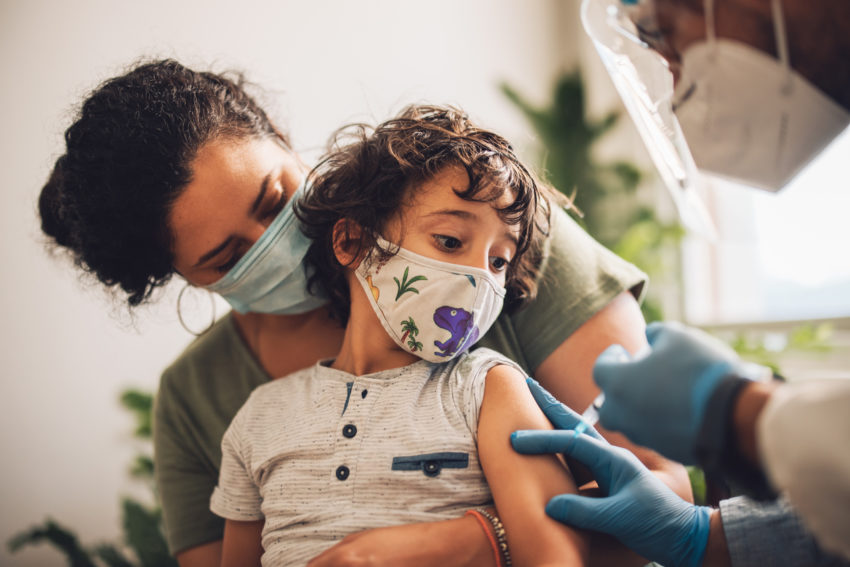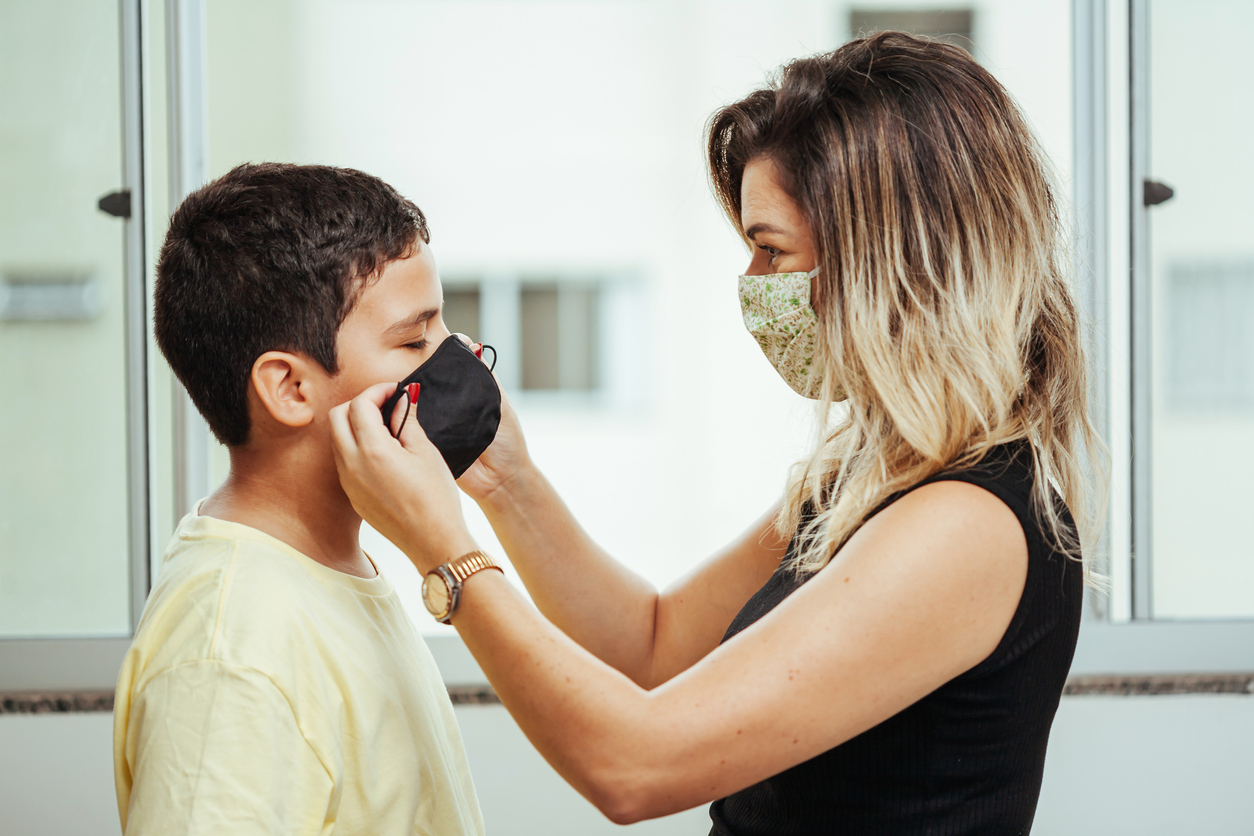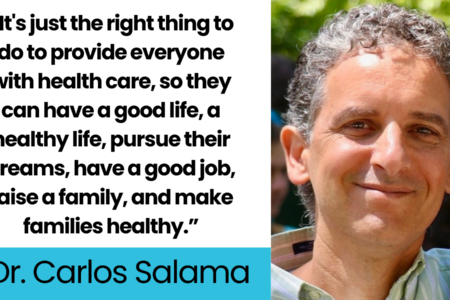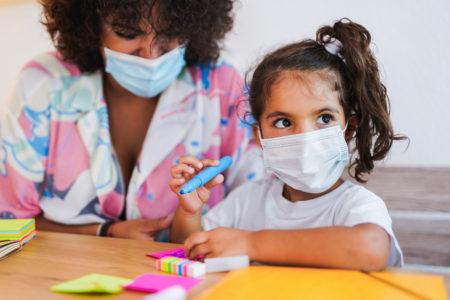
Share On Social!
On Oct. 29, 2021, the FDA authorized the Pfizer-BioNTech COVID-19 vaccine for emergency use for children ages 5 to 11. It had previously been approved for those ages 12 and older.
The move will make the vaccine available to 28 million children in this age group.
Getting children vaccinated is vital for controlling the spread of the pandemic, especially as many schools have returned to in-person learning.
Do you have questions about the Pfizer vaccine and want to know more before your children get vaccinated?
Here’s what Latino parents should know.
Update 1/19/22: Greater than COVID shared new videos in English and Spanish featuring doctors answering questions about the COVID-19 vaccines for kids 5-11.
Is the vaccine safe for children? Why was it produced so quickly?
Yes. Numerous clinical trials with young children have found that the Pfizer-BioNTech vaccine is safe and effective for children.
COVID-19 vaccines are being produced and authorized faster than vaccines in the past have been for other pandemics and viruses. The COVID-19 vaccines were produced faster because of more funding, urgency, and years of prior research.

In the past, vaccines have taken a longer time to reach the public because of a lack of funding and resources.
With the COVID-19 vaccines, companies around the world have dedicated billions of dollars to help fund the efforts to fight the virus, because everyone recognizes how important it is to reach immunity.
Even though COVID-19 vaccines have only been in development for the last year, it will be safe for the public because of the rigorous clinical trials that they have gone through.
When can this group of kids start getting their shots?
The Pfizer vaccine should be available as soon as Wednesday, Nov. 3.
Children can get their shots at any location that serves children’s health, as well as the same locations that are offering the vaccine to other groups.
“The Biden administration has promised that children’s shots will be easily accessible at pediatrician offices, community health centers, children’s hospitals and pharmacies, with 15 million doses ready to ship immediately,” according to The New York Times.
Check salud.to/findvaccine to find COVID-19 vaccination sites near you!
Is the vaccine administered differently for children?
No, it is the same as for adults.
The Pfizer vaccine requires two shots to be fully protected. The second shot is to be scheduled 21 days after the first.
To learn more about vaccines and vaccine misinformation, click here.
Why Should Children Get the COVID-19 Vaccine?
Some may wonder why children need to get the COVID-19 vaccine at all.
While CDC data has shown that children are less likely to get severely infected compared to older populations, the risk is still present.
“While fewer children have been sick with COVID-19 compared to adults, children can be infected with the virus that causes COVID-19, can get sick from COVID-19, and can spread the virus that causes COVID-19 to others. Children, like adults, who have COVID-19 but have no symptoms (“asymptomatic”) can still spread the virus to others,” according to the CDC.
While the risk is lower, some children do become severely ill and die.
“During the pandemic, COVID-19 has been one of the leading causes of death among children, Dr. Sean O’Leary of the American Academy of Pediatrics tells NPR — some 300 to 600 children have died,” according to NPR.
The risk of severe illness and death may be much higher for immunocompromised children and children with underlying health conditions.
Latino children, who disproportionately experience medical conditions like diabetes and obesity, are at a high risk for severe COVID-19 infection.
“Latino children and young adults account for over 40% of the COVID-19 deaths among people ages 0-24,” according to the CDC.
Latino children are more likely to spread COVID-19 among families that live in multi-generational households or have family members working front line, high-risk service jobs.
Vaccinating children can make a big impact in preventing the spread of COVID-19 among Latino communities, which have felt a huge burden from the virus over the last year.
Getting children vaccinated will help them stay healthy and stay in school and restore a normal life.
What Can You Do to Promote Vaccine Confidence?
Vaccine misinformation is prominent and often targets Latinos.
Stay informed by learning the facts about COVID-19 and the vaccine.
One resource you can use is Salud America!’s Latino COVID-19 Vaccine “Change of Heart” Bilingual Storytelling Campaign. The campaign shares the stories of real Latinos who overcame misinformation, got the vaccine, reconnected with family, and are helping end the pandemic.
Helen Cordova is one of the Latinas who was unsure about the vaccine initially. She was nervous it was produced too quickly and that it wouldn’t be safe.
But after learning more about the vaccine, she decided to get it so she could protect her family and her patients in the ICU. She became the first person in California to get vaccinated!
You can share Helen’s story with your friends, family, and colleagues!
By The Numbers
142
Percent
Expected rise in Latino cancer cases in coming years




[…] The pandemic is another chapter in the bitter story of American racism and inequality. Black and Latinx people are being infected and are dying at much higher rates than white Americans. Many people of […]
[…] coronavirus has killed over 61,000 Latinos in America according to the CDC, accounting for over 18.2% of the total COVID deaths in the […]
[…] Whereas Hispanics make up 11% of D.C.’s inhabitants, they signify 19% of the COVID cases, and 14% of the deaths. Equally, 46% of D.C.’s residents are Black, they usually make up an alarming 75% […]
[…] and historical mistreatment. According to the U.S. Centers for Disease Control and Prevention, Latino and Black American communities are three times more likely to become infected with […]
[…] Covid pandemic has hit the Latino community particularly hard, and data from the nonprofit health equity advocacy group Salud America! shows Latinos lead in the 0-24 age […]
[…] the pandemic, Latinos took major blows, both in terms of COVID-19 cases and also from the economic recession under former President Donald Trump. Nearly half (49%) of […]
[…] the positive trend, the harm may have already been done. The pandemic has disproportionately impacted Latino communities. Reuters reported that election-related or political disinformation that […]
[…] pesar de la tendencia positiva, es posible que el daño ya esté hecho. La pandemia ha impactado desproporcionadamente Comunidades latinas. Reuters informó que la desinformación política o relacionada con las […]
[…] residentes blancos muestran una tasa mucho más baja con 10 muertes por cada 100,000 habitantes(8 9) . Los afroestadounidenses por su parte, denuncian subsistemas de salud que les segregan […]
[…] https://salud-america.org/coronavirus-case-rates-and-death-rates-for-latinos-in-the-united-states/ […]
[…] https://salud-america.org/coronavirus-case-rates-and-death-rates-for-latinos-in-the-united-states/ […]
[…] communities have the second-highest number of COVID-19 cases in the U.S. They’re also more likely to become hospitalized and die from the disease than other […]
[…] total, around 160,000 Latinos were killed by COVID-19. This accounts for 16% of the 1 million deaths in the country. The […]